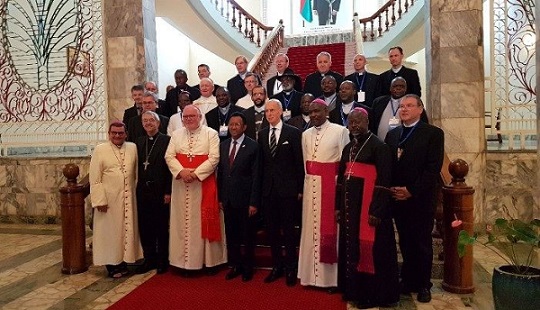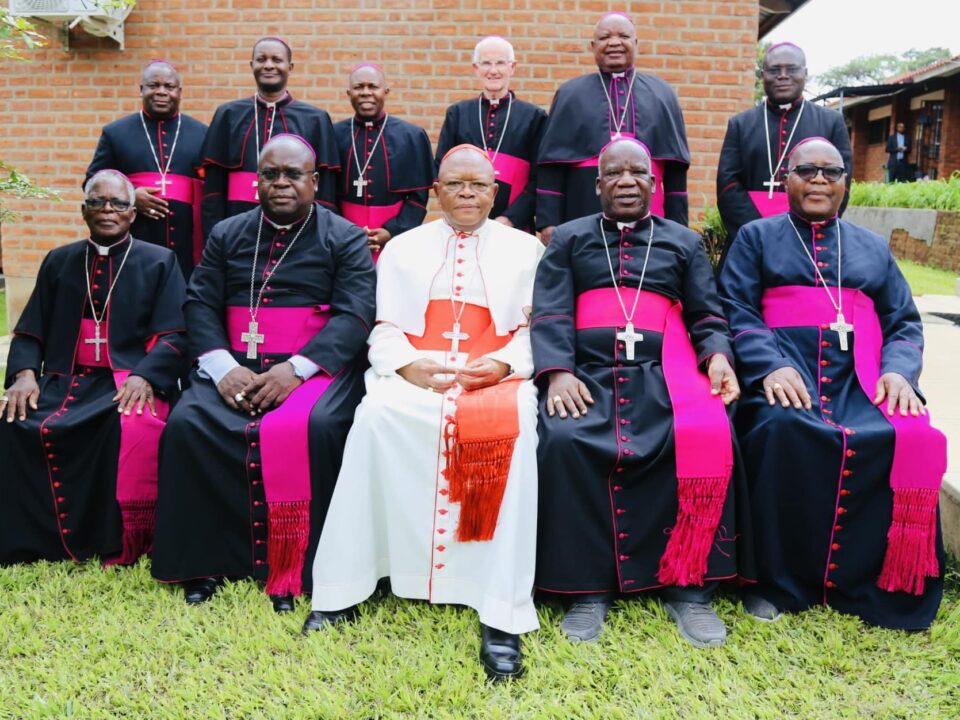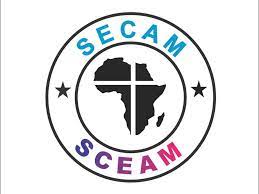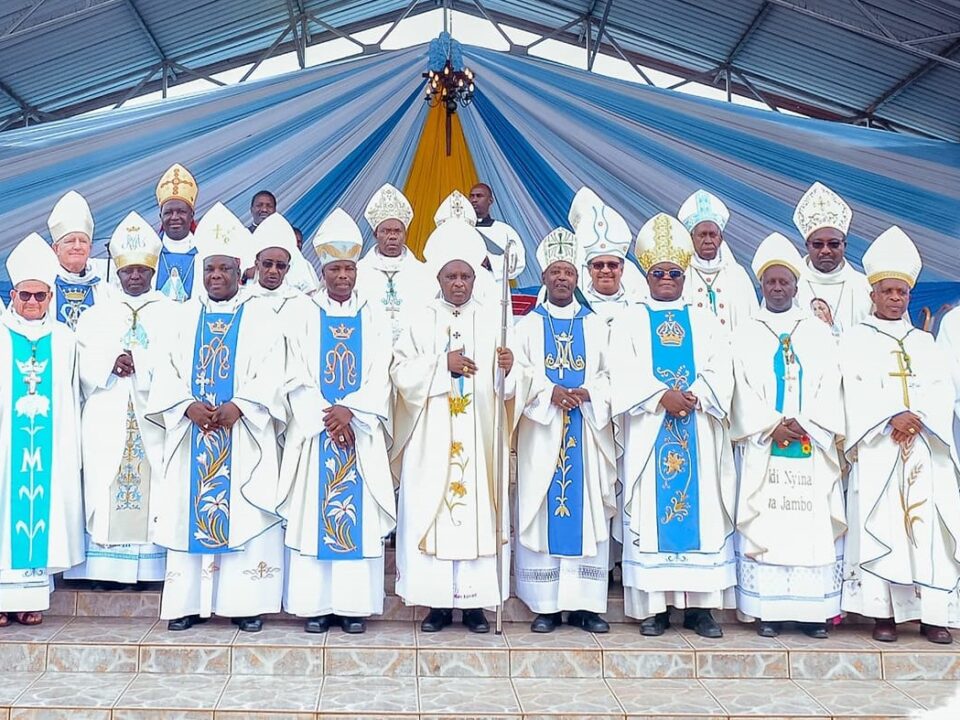- Contact us on - Contactez-nous sur - Contacte-nos em
- +233-30-277-8867/8
- +233-30-277-2548
- secam@secam.org
SECAM and German Bishops Share Evangelization Insights from Week-long Meeting in Madagascar
SECAM and German Bishops Share Evangelization Insights from Week-long Meeting in Madagascar
CANAA || By Father Don Bosco Onyalla, Nairobi || 04 June 2018
 Representatives of the German Bishops’ Conference and those of the Symposium of Episcopal Conferences of Africa and Madagascar (SECAM) have shared insights from their week-long meeting (May 22-27, 2018), which took place in Antananarivo, Madagascar.
Representatives of the German Bishops’ Conference and those of the Symposium of Episcopal Conferences of Africa and Madagascar (SECAM) have shared insights from their week-long meeting (May 22-27, 2018), which took place in Antananarivo, Madagascar.
In a message at the end of their meeting, the Church leaders shared how, during their meeting, they had “learned more about development in modern times and most especially what the Catholic Social Doctrine teaches about Integral Human Development,” emphasizing the theme of their meeting.
“We shared personal experiences and understanding of integral human development and, especially, its inseparable relevance to the Church’s mission of evangelization,” the Bishops continued in their collective message sent to CANAA.
“In our discussions, we could not but agree that as Church, both in Africa and in Germany, the Holy Spirit is opening our eyes to the fact that we still have a lot to do in our mission of evangelization,” the Church leaders stated.
Below is the full text of the Bishops’ collective message, which includes seven resolutions.
MESSAGE FROM THE EIGHTH GERMAN-AFRICAN BISHOPS’ MEETING.
(Antananarivo, May 22-27, 2018.)
Greeting: The grace and peace of our Lord and Saviour Jesus Christ be with you all. Dearly beloved brothers and sisters and all of you men and women of goodwill, from May 22 to 27, 2018, we, representatives of the German Bishops’ Conference and of the Symposium of Episcopal Conferences of Africa and Madagascar (SECAM) have met in Antananarivo, the sprawling capital of the Republic of Madagascar. This is the eighth meeting of this organ in search of greater communion and collaboration within our local Churches, which was started in the 1980s in order to share knowledge and experiences and to better serve the mission of Evangelization entrusted to the Church by Our Lord and Saviour Jesus Christ (see Mt. 28:18-20).
The theme for this meeting was “Integral Human Development”, necessitated by the socio-cultural developments (some positive and others negative) of secularisation and globalization that the world is traversing these days, and also inspired by the Catholic Social Doctrine of our Popes in the last fifty years, especially Populorum Progressio of 1967 by Blessed Pope Paul VI, in which he gave a critical definition of development, through Pope Benedict XVI’s Caritas in veritate of 2009 and the recent Encyclical Laudato Si’ of 2015 by Pope Francis.
As Bishops, we took time to pray and to solicit divine grace from daily celebrating the Holy Eucharist, a memorable one of which was the Opening Holy Mass with the Bishops of the Episcopal Conference of Madagascar at the Parish of St. Francis Xavier, Antananarivo, and the participation of the People of God. We take this opportunity once again to congratulate His Eminence Desire TSARAHAZANA, Archbishop of Toamasina, for his elevation as Cardinal.
During our meeting, we the participants were especially privileged to have audience with the President of the Republic of Madagascar, His Excellency Hery RAJAONARIMAMPIANINA at the Presidency, and to inform him of our presence and purpose in Madagascar. He in turn shared with us some views with reference to our theme and his country. We also took time to visit some sites in the country to see the beauty of God’s creation and to acquaint ourselves with some of the challenges of development of the people.
In our meeting, we learned more about development in modern times and most especially what the Catholic Social Doctrine teaches about “Integral Human Development”. We shared personal experiences and understanding of integral human development and, especially, its inseparable relevance to the Church’s mission of evangelization. Our Lord and Saviour Jesus Christ came that humanity may have life and have it to the full (see Jn. 10:10). We are grateful to God for this moment of grace, and we hereby share some of our deliberations, reflections and resolutions with you, dear People of God in our local Churches of Germany and Africa, and with all men and women of goodwill all over the world.
Integral Human Development in the Evangelization Mission of the Church: In the Church’s Social Doctrine, Blessed Paul VI, in Populorum Progressio taught that: “Development cannot be limited to mere economic growth alone. In order to be authentic, it must be complete: integral, that is, it has to promote the good of every person and of the whole person”.
In order to be complete and integral, human development must ensure the total well-being of the person, of every person and of every human society. It must involve the sustained growth of every one, ensuring that he/she enjoys just and peaceful relationships in a thriving environment of cultural, political, economic, social and spiritual wholeness among others. This wholeness should also include the wellbeing of his/her family, society and nature. In fact, it must also guarantee respect for the sacredness of human life, the dignity of every person and the integrity of creation, which Pope Francis calls “our common home” in Laudato Si’.
We are very convinced that as Bishops of Germany and Africa sent by Christ to bring the Good News of salvation to all peoples until the end of the earth (see Mt. 28:18-20), we must renew our missionary zeal working for integral human development as an indispensable part of our mandate, and so we invite you all our clergy and religious, lay women and men, youth and children, professionals in all sectors of human endeavor and socio-political and traditional leadership to contribute to this work of bringing to all persons the fullness of life that Christ came to accomplish.
In our discussions, we could not but agree that as Church, both in Africa and in Germany, the Holy Spirit is opening our eyes to the fact that we still have a lot to do in our mission of evangelization. Just a casual look at the situation in Africa and what stares us in the face is poverty and misery and disease and despair in the midst of God’s plentiful gifts of human and natural resources; these are ills caused by human greed and corruption, injustices of all kinds and violence and fratricidal wars, etc. The situation of Europe also leaves us also worried at the dearth of spiritual values, excessive materialism and consumerism, individualism, little or no of respect for the life and rights of the unborn, of the aged and the infirm, etc. All of these evils, be they in Africa or in Europe, all point to the fact that as Church we still have a lot to do in our evangelization mission.
It is not simply the proclamation of the Good News of Jesus Christ to all, but also the work of deepening our Christian formation and the formation of consciences of our political and socio-economic leaders, as well as the offering of true witness of our faith in Christ Jesus as the Lord and Saviour of all men and women, believers or otherwise.
Evangelization should lead all to understand and develop their lives of relationships with God, with their fellow women and men, and with creation. This work of building relationship demands that we work with all women and men of good will in order to create a new and better world for all to have the chance to develop their talents to the best of their capabilities, and to bring these to serve every body, living and even yet unborn.
Resolutions: The following aspects for the promotion of integral human development are of particular relevance to our resolutions:
1. We renew our commitment to work for a more just world together with all women and men of good will. All human beings have the right to live a decent life. Their basic needs must be ensured, such as access to adequate nutrition, drinking water, education and medical support. All have a right to equal access to markets, humane working conditions and basic social services as well as the opportunity to participate in political decision-making and implementation.
2. This social and economical path of development of humanity needs to respect the ecological limitations of our planet earth, our common home. Without an effective control of the climate change, the opportunities for the poor and poor countries in particular would be drastically reduced. Pope Francis is calling on us urgently to hear the “cry of the earth and the cry of the poor” (LS 48)!
3. Obstacles to integral development can be found within individual countries as well as on the international scene. We speak up for a more just global order especially regarding international trade that offers the same opportunities to all countries and peoples.
4. Integral development can only be successful when discrimination of people, especially of women is eradicated. The empowerment of all women worldwide and in all fields of society is a necessary pre-condition for the development of every single person and of the whole of humanity.
5. As the Church in Africa and in Europe, we commit ourselves to ensure that our evangelization mission and work are inseparably tied to the demands of integral human development: No evangelization without efforts of development! The aims of integral human development should resonate within all aspect of Church life – in liturgical issues, in our catechism, education, welfare and social work. In our universities, faculties of theology and philosophy, seminaries and Catholic schools, we will promote the teaching of Catholic Social Doctrine in order to enable the priests, religious and lay people to promote integral human development of all persons, always and everywhere.
6. We resolve to be advocates of integral human development in our own countries as well as on the international scene even more effectively and more convincingly than before. The Church is a global institution, a global player, offering opportunities that need to be used resolutely – with priority to the well being of the poor and the integrity of creation.
7. We undertake to continue this dialogue and cooperation and communion between the Church in Africa and in Germany. SECAM and the German Bishops’ Conference will elaborate a follow-up programme to our Antananarivo encounter in order to realize our common vision and our concrete proposals in the Church and society. The Church agencies in Germany and their counterparts in Africa (SECAM) will be involved in this process and will engage the necesary scientific and professional capacities on both sides. Moreover, we are looking forward to the next meeting of the African and German Bishops for still more fruitful dialogue and exchange towards greater ecclesial collaboration and communion.
We are thankful for the fraternal communion and greater understanding with each other and as representatives of our local Churches. At this meeting in Antananarivo, we have become more aware of the unique wealth and unique opportunities that characterize our Church, universal and global. We are a global community and communion of learning, prayer and solidarity, sent to be witnesses of faith, hope and love to the whole world. By so doing, we are serving the integral development of every person and of the whole human person.
While entrusting this our messge to the maternal solicitude of the Most Blessed Virgin Mary, Mother of the Church, we say: “To God be the glory, great things he has done! Greater things he will do for all his children!”
Signed:
His Excellency Archbishop Gabriel MBILINGI
Archbishop of Lubango, Angola
President of SECAM.
His Eminence Reinhard Cardinal MARX
Archbishop of Munich-Freising, Germany
President of the German Bishops’ Conference.
Sunday, May 27, 2018.




